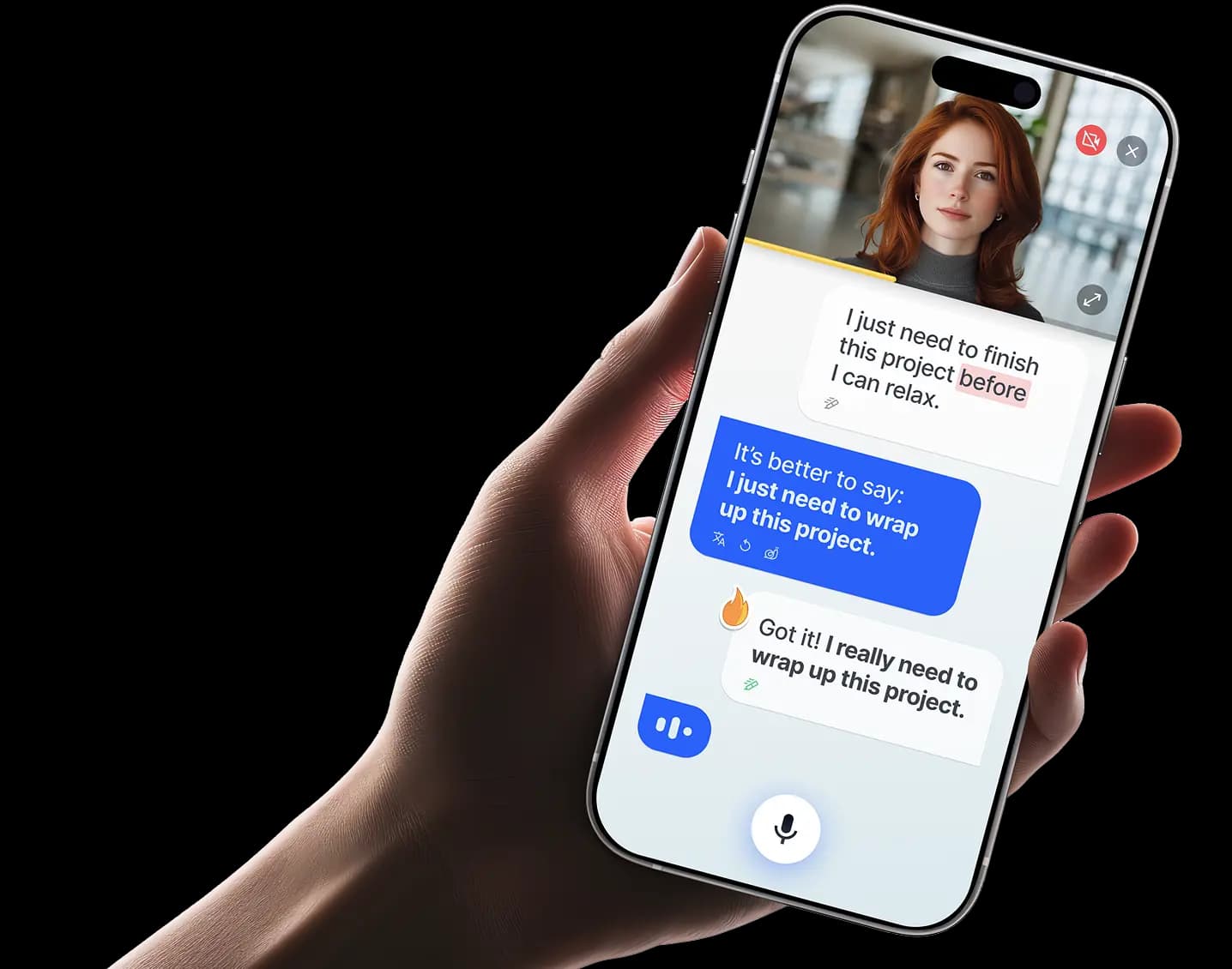Advanced English Words: Master Complex and Powerful Terms

Want to feel confident jumping into professional, academic, or creative conversations in English? Expanding your vocabulary is the way to go. It’ll take your writing and speaking skills to the next level, helping you express your ideas with clarity and precision.
No more feeling stuck or shying away from sophisticated discussions. With this guide, you’ll discover essential advanced English words, their meanings, and smart tips to add them to your everyday language seamlessly. Ready to level up? Let’s get started.
Key takeaways
Here are the main key takeaways from the article:
- Enhanced communication: Learn how sophisticated vocabulary improves clarity and expression
- Discover powerful words: Organized by conversation type—daily, professional, academic, creative
- Effective vocabulary learning strategies: We discuss crucial techniques for mastering advanced English vocabulary
- Commonly misused words: We highlight frequent errors in word usage and their correct usage.
Benefits of using advanced English vocabulary
Using an advanced English vocabulary primarily aims to communicate ideas more precisely, persuasively, and effectively. Typically, sophisticated words add depth and nuance to speech and writing, making conversations more engaging and professional.
Expanding your vocabulary with sophisticated terms not only boosts your confidence but also allows you to communicate clearly and effectively in academic and business settings, just like a native advanced speaker.
Top 15 advanced words in English
Ready to elevate your vocabulary? These 15 sophisticated words are perfectly organized by context to help you nail when and how to use each one with confidence:
For daily conversational use
Here are some advanced conversational words you can use daily.
1. Ephemeral
Pronunciation: /əˈfɛmɚrəl/
Ephemeral (adj.) means “lasting for a very short time, state.”
Example: Winter sunsets have an ephemeral beauty.
2. Serendipity
Pronunciation: /ˌsɛrənˈdɪpɪti/
Serendipity (noun) means a "happy accident" or "by coincidence."
Example: Meeting Alice at that coffee shop was pure serendipity–she mentioned the perfect job opening just as my contract was ending.
3. Quintessential
Pronunciation: /ˌkwɪn.tɪˈsɛn.ʃəl/
Quintessential (adj) means the “perfect example of something.”
Example: The old store was the quintessential gathering place for chess lovers.
For professional settings
If you’re looking to take your English vocabulary up a notch at your workplace, here are three most advanced examples to consider.
4. Precedent
Pronunciation: /ˈprɛsɪdənt/ or /ˈprɛsədənt/
Precedent (noun) means something that serves as an example or guide for future actions, especially in decision-making or problem-solving.
Example: We should establish a strong precedent for handling similar cases in the future to ensure consistency in our approach.
5. Paradigm shift
Pronunciation: /ˈpɛrəˌdaɪm/ /ʃɪft/
Paradigm shift (noun) is a word that describes revolutionary changes in how we understand or approach something.
Example: Remote work adoption during the pandemic triggered a paradigm shift in corporate culture, transforming traditional office centric policies into flexible work arrangements that prioritize results over physical presence.
Ubiquitous
Pronunciation: /juˈbɪkwɪtəs/
6. Ubiquitous
Pronunciation: /juˈbɪkwɪtəs/
Ubiquitous (adj) means "omnipresent".
Example: Smartphones have become ubiquitous in modern work environments.
For academic writing
Those in academia can incorporate the following advanced words in their academic literature.
7. Pedagogy
Pronunciation: /ˈpɛdəˌɡoʊdʒi/ or /ˈpɛdəˌɡɑdʒi/
Pedagogy (noun) means the art and science of teaching–including methods, theories, and practices that shape educational experiences.
Example: Her pedagogy emphasized hands-on learning experiences.
8. Dichotomy
Pronunciation: /daɪˈkɑːtəmi/
Dichotomy (noun) is a term referring to a clear division between two opposing ideas, elements or groups.
Example: The research establishes a clear dichotomy between System 1 and System 2 thinking–intuitive and automatic versus deliberate and analytical–providing a framework for understanding human cognitive strengths and limitations.
9. Empirical
Pronunciation: /ɛmˈpɪrɪkəl/ or /ɪmˈpɪrɪkəl/
Empirical (adj) means to be based on direct observation or experience rather than theory alone. Example: The study provided empirical evidence supporting their hypothesis.
For creative writing
Creative writers aren’t left out of the mix; here are three advanced words to incorporate during your writing process.
10. Mellifluous
Pronunciation: /məˈlɪfluəs/
Mellifluous (adj) means pleasingly smooth and musical to hear, like honey flowing. Derived from Latin roots meaning “honey” and “flowing, this term perfectly captures sounds that feel effortlessly smooth and sweetly pleasing to the ear. Beyond merely “pleasant,” mellifluous sounds have a liquid, flowing quality.
Example: The jazz vocalist’s mellifluous tones seemed to pour like warm honey, each note flowing seamlessly into the next.
11. Ethereal
Pronunciation: /ɪˈθɪriəl/ or /əˈθɪriəl/
Ethereal (adj) means extremely delicate and light, heavenly or celestial. The word suggests something so refined and exquisite that it does not seem from this world.
Example: The morning mist gave the landscape an ethereal quality.
12. Ineffable
Pronunciation: /ˌɪnˈef.ə.bəl/
Ineffable (adj) is a word that acknowledges the limits of language when faced with transcendent beauty, grief, or wonder.
Example: The aurora borealis’ beauty is truly ineffable.
For analytical discussions
You can apply the following advanced words during analytical discussions if you find yourself in a think tank setting or anywhere else you want the depth of your brilliance to shine.
13. Nascent
Pronunciation: /ˈneɪ.sənt/
Nascent implies something that’s only just beginning to exist or develop. The word comes from the Latin root word "nasci," meaning "to be born," which captures that crucial moment when something shows both current immaturity and future promise.
Example: The nascent technology showed promising results in early trials.
14. Pragmatic
Pronunciation: /præɡˈmæt̬.ɪk/
Pragmatic means dealing with things sensibly and realistically. The word comes from the Greek "pragma," meaning "deed," suggesting a clear-eyed, realistic view that values important and workable solutions over perfect but impractical ones.
Example: They took a pragmatic approach to solving the complex machine learning problem.
15. Nuanced
Pronunciation: /ˈnuː.ɑːnst/
Nuanced means to be characterized by subtle differences, variations, or distinctions. The word describes an understanding that recognizes fine shades of meaning or small differences in complex situations. You use the word “nuance” to suggest an appreciation for complexity and an ability to perceive and express subtle variations.
Example: The issue required a more nuanced understanding than I initially thought.

Tips on using higher-level English words to make your vocabulary more advanced
Want to actually remember and use advanced words? Try this:
1. Learn words in context
When you encounter an unfamiliar word, don’t just look up its definition and move on. Instead, write down the entire sentence where you found it, note the source (book, article, lecture), and observe how the word functions in that specific situation. Ask yourself: What is being described? Is the tone formal or casual? What emotions does it convey? Then, create your own sentence using the word in a similar context before trying it in different situations. Review these contextual examples regularly, and you’ll find that word stuck in your memory!
For instance, if you encounter the word "ephemeral" in a novel, note how it describes the current situation and captures the emotional experience of witnessing something beautiful yet fleeting. It is a strong method for creating multiple memory hooks: the meaning, the emotion, and the practical usage.
2. Use strategic repetition
A great idea to add new words to your advanced English vocabulary is to create a personal system to reinforce them. Using a word once won't make it stick. The number of exposures needed depends on the learner and ranges from 5 to 20. Generally, 8 to 10 exposures are necessary for you to have a good chance of recognizing and understanding a new word later on.
You can use specialized applications like Loora, which focuses on using the word in the correct contexts. Listen to her vocabulary and repeat the words you think will be useful when it’s your turn to speak.
3. Consider thematic clustering
Thematic clustering is another effective way to learn advanced vocabulary by grouping words based on common themes rather than just meanings. This method helps reinforce word connections and makes it easier to recall them in context.
For example, if you're learning ethereal, you could organize it within different themes like:
- Nature & the Elements
Ethereal (light, airy, delicate)
Luminous (glowing, shining softly)
Gossamer (thin, delicate, like spider silk)
- Spiritual & Mystical
Ethereal (heavenly, otherworldly)
Celestial (relating to the sky or the heavens)
Transcendent (beyond ordinary experience)
- Art & Aesthetics
Ethereal (delicately beautiful, almost unreal)
Exquisite (extremely beautiful or well-made)
Sublime (awe-inspiring, grand)
4. Start active usage
Build confidence with new vocabulary by using it in low-risk situations first. Challenge yourself to use 3 more advanced words in your daily conversation with Loora to test out how they sound and feel in natural conversations. Other options include personal journal entries, practice emails to yourself, or participating in online forums. Then, you can gradually move to more challenging contexts as your comfort grows.
5. Practice pronunciation
Try to develop confidence in the words’ pronunciations by recording yourself using high-level English words or listening to audio dictionaries. After learning words in thematic clusters and identifying real-life situations where they apply, focus on mastering their pronunciation. Record yourself using these words in complete sentences relevant to your life–not in isolation.Ask Loora for feedback on your pronunciation of these new words and include them in your conversations.
For example, practice saying, “The ephemeral nature of the pop-up exhibit makes it worth visiting this weekend” rather than just “ephemeral” alone. You can also ask Loora to help you think of common collocations such as ‘luminous skin’ or ‘sublime taste’ that make you sound more natural.
FAQs
When should I use my advanced words?
The key to using advanced vocabulary is knowing when it fits the moment. It’s not just about sounding smart—it’s about making sure your message connects with your audience. Adapt your language to match the situation and the people you’re communicating with.
For example, in professional or academic settings, advanced words can show your expertise and add clarity. However, in casual conversations, simpler words might be better for keeping things relatable.
What are the 5 most commonly misused words in English?
For anyone wondering, "What are the 10 most commonly misused words in English?" Here is a list of them, together with their correct usage:
- Literally: This word is often misused for emphasis (e.g., "I literally died laughing at his impression of John Malkovich"), but it's only correctly used for something that happened in reality.
- Irregardless: This is a nonstandard word misused instead of "regardless."
- Effect: Effect is a word that means a result (e.g., "The new law had a huge effect"). It is one of the "advanced" words in English that's often mistaken for Affect, which means to influence (e.g., "The weather affects my mood").
- Complement: Complement means something that enhances another thing (e.g., "That scarf is a nice complement to your outfit"). It is often misused in place of "Compliment,” which means a nice remark (e.g., "She gave me a compliment on my shirt").
- Farther: “Farther” refers to the physical distance (e.g., "She ran farther than me") and not “Further,” which is a figurative distance or progress (e.g., "We need to discuss this further").
Which words are commonly confused among English speakers?
1. Effect v Affect: "Effect" is most commonly used as a noun that describes the outcome or result of an event or action. For instance, when you say that a new regulation had an "effect" on an industry, you are referring to the consequences that follow. Although "effect" can occasionally be used as a verb meaning to bring something about (as in “to effect a change”), this usage is less frequent.
In contrast, "affect" is primarily a verb and denotes the action of influencing something. When you discuss how a policy might "affect" small businesses, you imply that the policy will influence or impact them. It is worth noting that in some specialized contexts, particularly in psychology, "affect" as a noun describes an observable expression of emotion. However, in everyday usage, you will predominantly encounter it as a verb.
2. Compliment v Complement: The difference between “compliment” and “complement” lies in the type of relationship each word describes. A "compliment" is a verbal or written expression of praise or admiration; for example, when you tell someone their new presentation is impressive, you are giving a compliment.
On the other hand, "complement" refers to something that completes or goes well with another element. If you describe a piece of art as complementing the interior décor of a room, you mean that it enhances or completes the aesthetic appeal of the space. Here’s an interesting way to remember the distinction: the one with an “i” involves a sort of verbal "admiration," while the one with an "e" is related to completing or “enhancing” something.
3. Farther v Further: When comparing “farther” and “further”, the primary distinction is that "farther" is used when referring to physical distance. For example, if an athlete runs a distance farther than a competitor, the distance mentioned is literal and measurable.
Contrast this to "further" being generally used for figurative or abstract extensions, such as extending a discussion or investigating a matter in more detail. In some contexts, the two words are used interchangeably, but using "farther" for measurable, physical distances and "further" for non-physical or additional degrees helps maintain clarity.
4. Eminent v Imminent: "Eminent" is used to describe someone who is highly respected, distinguished, or famous – typically in a positive sense. For example, when referring to a celebrated professor who is a leading authority in their field, you might describe them as eminent.
In contrast, "imminent" is used to suggest that something, often significant or potentially unwelcome, is about to occur. When dark clouds accumulate before a storm, the storm is considered imminent. A helpful way to remember this is to connect "eminent" with esteemed (positive) accomplishments, while "imminent" is linked with something that is incoming (negative).
5. Ingenious v Ingenuous: "Ingenious" characterizes a person or idea as being particularly clever, innovative, or inventive. If an engineer devises a novel solution to a complex problem, that solution might be described as ingenious.
Conversely, "ingenuous" refers to someone who is innocent, naive, or sincere, often without any pretense. A child’s straightforward and candid remark might be regarded as ingenuous. Recognizing that "ingenious" is about intellectual creativity while "ingenuous" pertains to an honest and unselfconscious demeanor can help you choose the right word in context. Also, you might want to pay attention to the spelling and pronunciations of both words: Ingenuous (/ɪnˈdʒɛnjʊəs/), ingenious (/ɪnˈdʒin·jəs/)
6. Allude v Elude: The verb "allude" means to make an indirect or subtle reference to something. If a writer mentions a historical event in a roundabout way without going into the specifics, they are alluding to that history.
In contrast, "elude" means to evade or escape from something, typically in a skillful
manner. For instance, if a criminal evades capture from the law, that person is eluding the authorities.
7. Disinterest v Uninterested: The distinction between “disinterest” and “uninterested” revolves around neutrality versus lack of interest. "Disinterest" is the state of being impartial or objective, especially in contexts where unbiased judgment is important. For example, a judge's disinterest in a case would imply fairness without personal investment.
On the other hand, "uninterested" describes a simple lack of interest or enthusiasm – when someone is bored or indifferent to what is happening, they are uninterested. Keeping this in mind clarifies that disinterest, in many cases, is a valued trait signifying neutrality, whereas being uninterested is more about personal disengagement.
8. Insure v Ensure: "Insure" is related to the provision of insurance; when you insure a property, you obtain a policy to safeguard against loss or damage. Sometimes, it is also used in a broader sense to mean taking measures to protect or secure something, although this usage is secondary.
Contrast that to "ensure", which means to make certain or guarantee that something will happen. For example, you might ensure that all safety procedures are followed during an event. The easiest way to remember this is to associate "insure" with insurance and "ensure" with making sure of an outcome.
What is a hard English word to say?
Eg., Epitome - The word “epitome” is often mispronounced by English learners (and sometimes native speakers) because its pronunciation doesn’t follow expected patterns. It’s pronounced “eh-PIT-oh-mee - not “EEP-i-tohm,” as the spelling might suggest.
Example: The pronunciation of epitome is the epitome of why English pronunciation is challenging!
How many English words exist?
There’s no exact count of how many English words exist because the language is constantly evolving. The Oxford English Dictionary estimates proper English words to be around 600,000, while Merriam-Webster puts the number of English words at around 470,000.
Engage in personalized conversations with Loora, the most advanced AI English tutor, and open doors to limitless opportunities.
